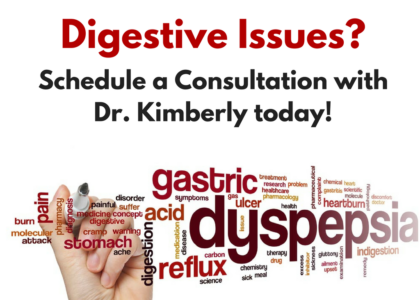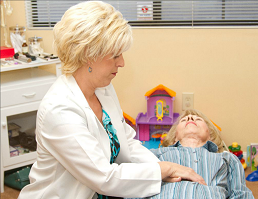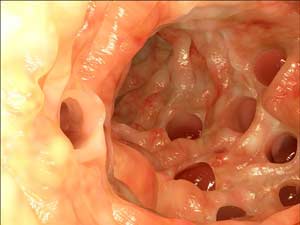
IBS, Ulcerative Colitis, Crohns Disease, Diverticulitis
Why live with this disease when it’s treatable?
Why live with this disease when it’s treatable?
 Dr. Kimberly simply cannot believe the numbers of people she meets out and about, and that sees in our office with digestive problems. Would you believe that 20% of the population has digestive difficulties? That is not acceptable. It is estimated that over 70 million people in North America suffer from digestive problems. Most of these patients feel that their difficulties are just an inconvenience. That they can get by with only the occasional stomach cramping, the occasional constipation, and the weekly diarrhea! Many hold the belief that rectal bleeding is normal, that blood in the stool is OK, explosive gas is fine, dizziness and trembling are normal, and that missing work or school because of these difficulties is just part of life – par for the course!
Dr. Kimberly simply cannot believe the numbers of people she meets out and about, and that sees in our office with digestive problems. Would you believe that 20% of the population has digestive difficulties? That is not acceptable. It is estimated that over 70 million people in North America suffer from digestive problems. Most of these patients feel that their difficulties are just an inconvenience. That they can get by with only the occasional stomach cramping, the occasional constipation, and the weekly diarrhea! Many hold the belief that rectal bleeding is normal, that blood in the stool is OK, explosive gas is fine, dizziness and trembling are normal, and that missing work or school because of these difficulties is just part of life – par for the course!
So many people are affected that there seems to be a sense that there is “safety in numbers.” That it somehow seems almost “normal.” Just because others have these symptoms does not make it normal or healthy. Have you ever wondered why, in such a technologically advanced society, so many people are sick? In the year 2000 alone, the pharmaceutical industry sold over 96 billion dollars in drugs to treat digestive problems. It has become very profitable to make drugs that deal with some symptoms without treating the cause.
Because medical doctors minimize the importance of these symptoms by simply masking symptoms with prescription medication instead of healing the underlying issue. Many people don’t really understand that symptoms of digestive distress are usually indicators that there is a malfunction somewhere within the system. By ignoring the symptoms, or disregarding them because the drugs are not fixing the problem, you are disregarding your body’s personal alarm system. The body does not like to be ignored and the problem will progressively get worse. After the minor alarms of indigestion, bloating, gas, heartburn, constipation and/or diarrhea are ignored, they will progress into more complicated conditions.
The three most common, complicated conditions affecting intestinal function that our doctors see in our practice are: Irritable Bowel Syndrome (IBS), Ulcerative Colitis, Crohn’s Disease and Diverticulitis. Dr. Kimberly feels these are all the same – just different stages have been given different names.
 Crohn’s Disease is the most serious. It is classified as an Inflammatory Bowel Disease (IBD) and is a long-term, chronic ulceration of the digestive tract. This condition extends through all the layers of your “digestive tube” In essence, the digestive system attempts to heal the localized ulcers and sores, and tends to produce scar tissue in the process This can literally restrict the movement of food through the system. These are referred to as strictures and can be very serious and life-threatening. Ulcerative Colitis: It usually involves the internal “mucosa” and “submucosa” layers of the intestine and the symptoms are almost identical to Crohn’s Disease. IBS is even lesser on this scale. It has been noted that Crohn’s Disease and Ulcerative Colitis increase the risk of colon cancer by as much as twenty times. This can also be said for IBS to a certain degree.
Crohn’s Disease is the most serious. It is classified as an Inflammatory Bowel Disease (IBD) and is a long-term, chronic ulceration of the digestive tract. This condition extends through all the layers of your “digestive tube” In essence, the digestive system attempts to heal the localized ulcers and sores, and tends to produce scar tissue in the process This can literally restrict the movement of food through the system. These are referred to as strictures and can be very serious and life-threatening. Ulcerative Colitis: It usually involves the internal “mucosa” and “submucosa” layers of the intestine and the symptoms are almost identical to Crohn’s Disease. IBS is even lesser on this scale. It has been noted that Crohn’s Disease and Ulcerative Colitis increase the risk of colon cancer by as much as twenty times. This can also be said for IBS to a certain degree.
If left untreated, bowel function slowly deteriorates and can be life threatening. The most common medical treatment for these conditions is anti-inflammatory and antispasmodic medication, surgery and diet. And while sometimes necessary, this type of approach does not really deal with the cause of these conditions – instead, it addresses just the symptoms.
